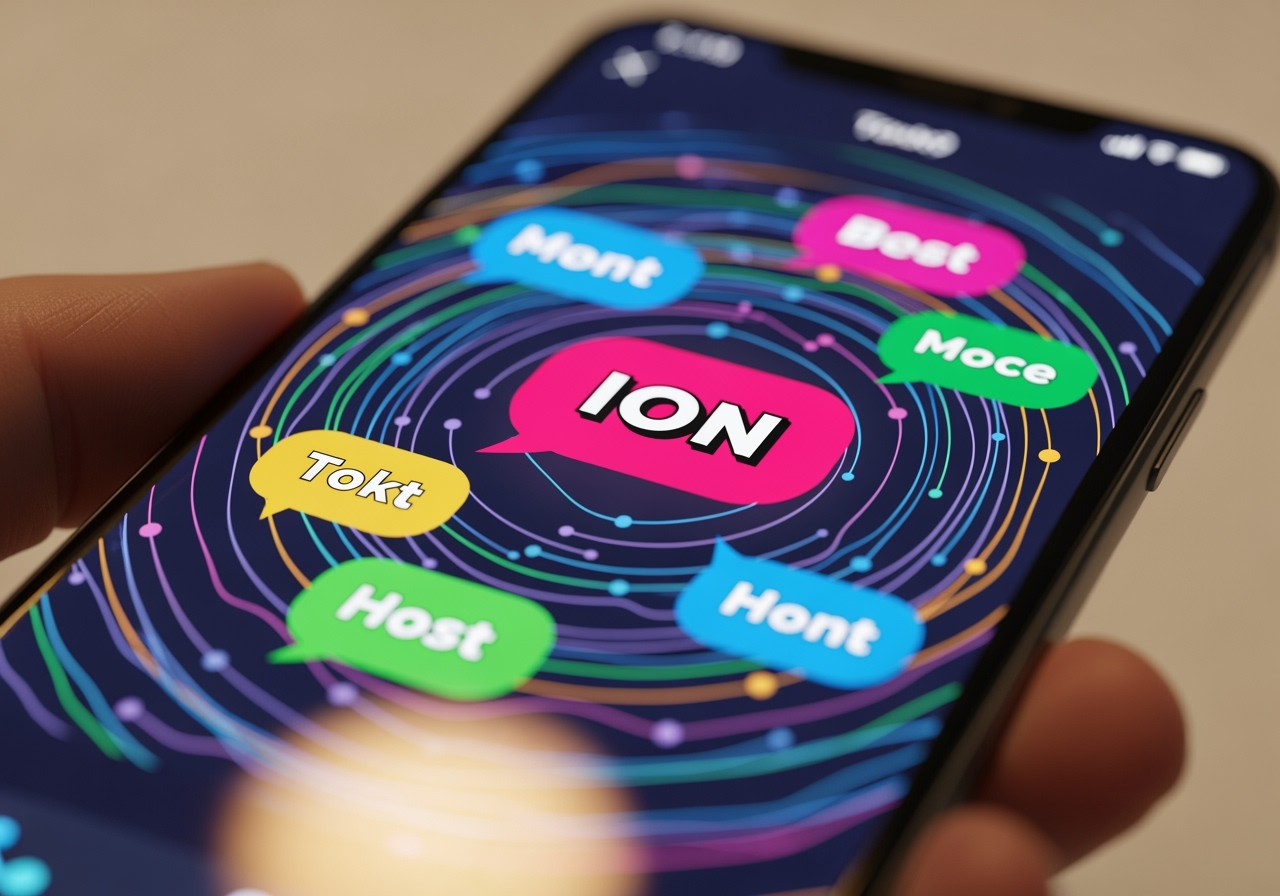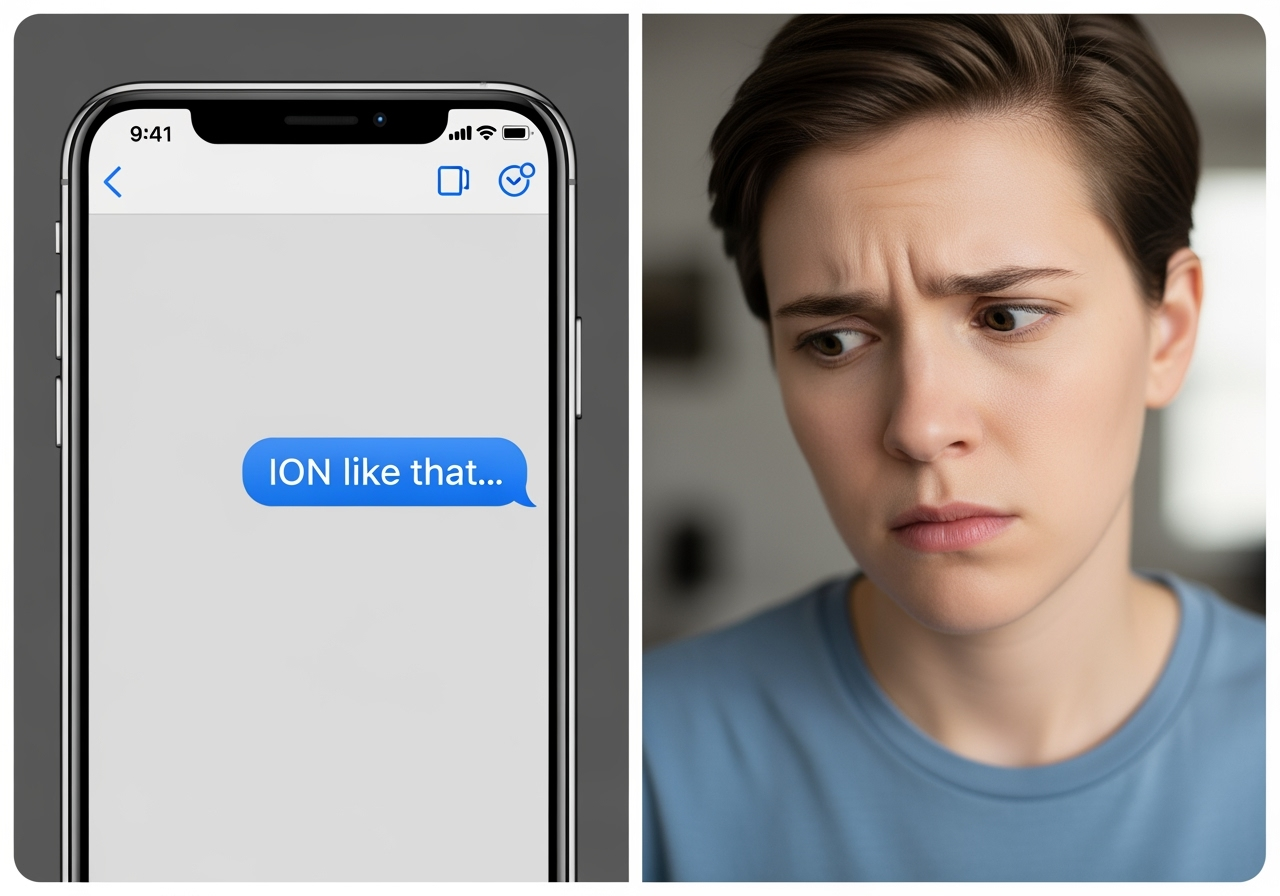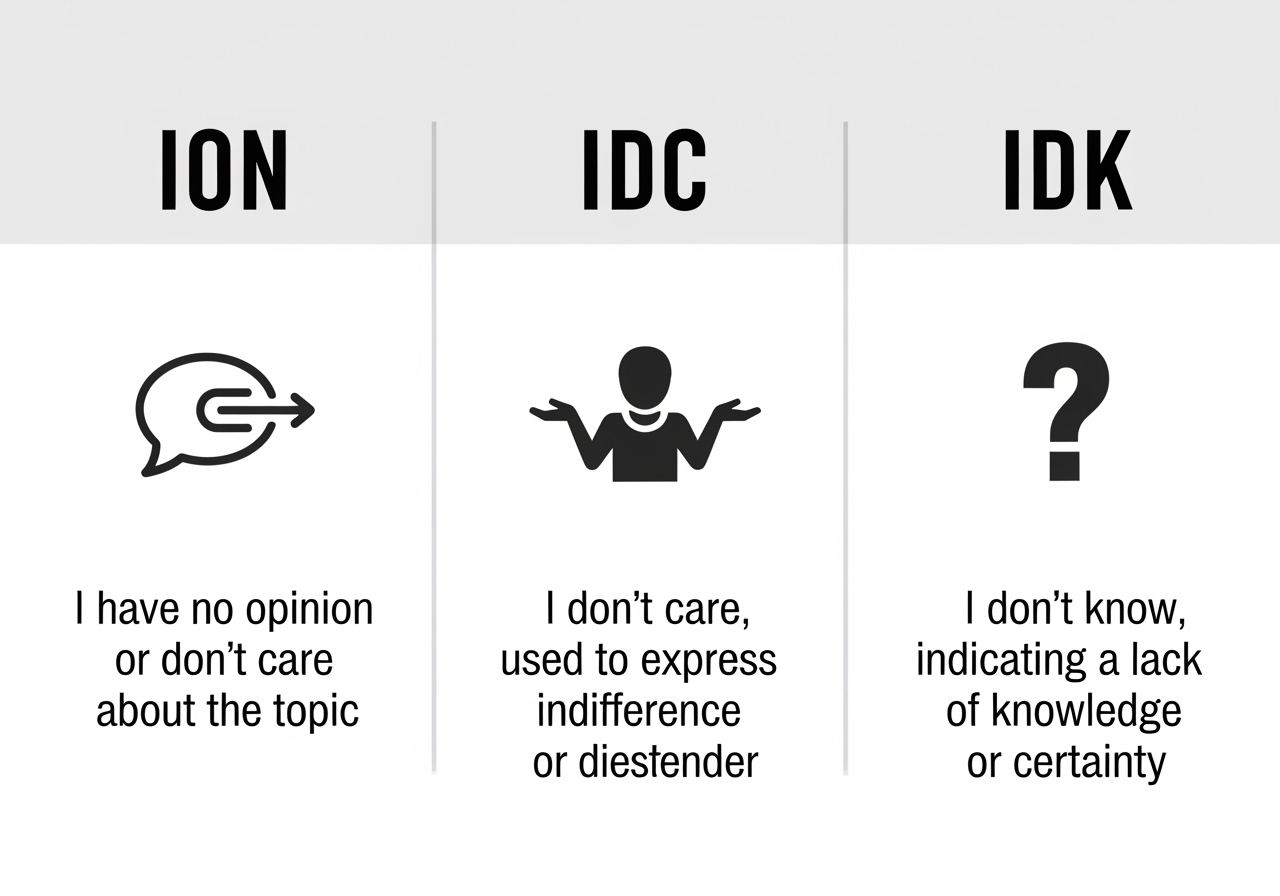what does ion mean in text
What Does 'ION' Mean in Text? A Complete Guide to the Popular Slang
Published on October 13, 2025

Table of Contents
- Introduction
- The Meaning of 'ION' in Text
- Origins and Evolution of 'ION'
- How 'ION' Is Used in Digital Communication
- Common Examples of 'ION' in Text Messages
- Other Meanings of 'ION' in Different Contexts
- Similar Slang Terms and Their Meanings
- Tips for Using 'ION' Appropriately
- Potential Misunderstandings and How to Avoid Them
- Conclusion
Introduction
In the fast-evolving world of digital communication, slang terms and abbreviations are constantly emerging and reshaping the way we interact online. From text messages to social media posts, these expressions help users convey thoughts quickly and with a sense of belonging to a particular digital culture. However, not all slang is immediately intuitive, and some terms can leave even seasoned texters scratching their heads.
One such term is “ION.” If you’ve ever come across “ION” in a text message or online chat and wondered what it means, you’re not alone. Despite its brevity, “ION” can be surprisingly confusing, especially since it has multiple meanings depending on the context. This guide will unravel the mystery of “ION,” exploring its origins, usage, and how to navigate its place in modern communication.
The Meaning of 'ION' in Text
At its core, “ION” in digital communication is a phonetic spelling of the phrase “I don’t.” When spoken quickly, especially in certain dialects, “I don’t” can sound like “ion.” This shorthand has found its way into text messages, tweets, and memes, where brevity and informality are prized.
For example, instead of typing “I don’t know,” someone might write “ion know.” Similarly, “I don’t care” becomes “ion care.” The term is typically used to express negation, denial, or a lack of interest, and it carries a casual, conversational tone that fits well in informal exchanges.
It’s important to note that “ION” in this context is not an acronym but rather a phonetic representation. Its usage is most common among younger demographics and those familiar with internet and texting culture.
Origins and Evolution of 'ION'
To truly understand “ION,” it helps to look at where it came from and how it evolved into a staple of digital slang.
Roots in African American Vernacular English (AAVE)
The phonetic spelling “ion” has its roots in African American Vernacular English (AAVE), where rapid speech patterns often blend words together. In AAVE, “I don’t” is frequently pronounced as “ion” or “ain.” As digital communication platforms grew in popularity, so did the written representation of this speech pattern.
Spread Through Social Media and Messaging
Social media platforms like Twitter, Instagram, and TikTok have played a significant role in popularizing “ION.” As users sought quicker and more expressive ways to communicate, “ION” became a go-to shorthand for expressing negation or disinterest. Memes and viral tweets further accelerated its adoption, making it a recognizable term even outside its original community.

From Spoken Word to Digital Slang
The transition from spoken language to written slang is a hallmark of internet culture. What starts as a regional or cultural speech pattern often finds new life online, where it can be adopted, adapted, and spread globally. “ION” is a prime example of this phenomenon, illustrating how digital spaces can amplify and normalize linguistic creativity.
How 'ION' Is Used in Digital Communication
Understanding how “ION” is used in practice can help demystify its meaning and guide you in using it appropriately.
1. Text Messaging
In text conversations, “ION” often appears in place of “I don’t,” especially when the sender wants to keep things casual or concise. For example:
- “Ion feel like going out tonight.”
- “Ion think that’s a good idea.”
2. Social Media Posts
On platforms like Twitter and Instagram, “ION” is used to express opinions, feelings, or reactions in a relatable, informal way. It’s common to see it in captions, replies, or meme formats:
- “Ion care what anybody says, pineapple belongs on pizza.”
- “Ion even know what’s going on anymore.”
3. Memes and Viral Content
Memes often rely on shared understanding of slang to land their punchlines. “ION” is frequently used in meme captions to convey a sense of apathy, confusion, or denial.

4. Demographics and Tone
While “ION” originated in AAVE, its use has expanded across various demographics, particularly among younger users who are active on social media. The tone is almost always informal, and using “ION” in a formal or professional context would likely be seen as inappropriate or confusing.
Common Examples of 'ION' in Text Messages
To further clarify how “ION” is used, let’s look at some real-world examples and break down their meanings.
Example 1: Expressing Disinterest
Text:
“Ion wanna watch that movie again.”
Meaning:
The sender is saying, “I don’t want to watch that movie again.” The use of “ION” makes the statement casual and direct.
Example 2: Denying Knowledge
Text:
“Ion know where she went.”
Meaning:
Here, “ION” replaces “I don’t,” so the message means, “I don’t know where she went.” It’s a straightforward way to express a lack of information.
Example 3: Showing Indifference
Text:
“Ion care what they think.”
Meaning:
This means, “I don’t care what they think.” The tone is dismissive and unconcerned.
Example 4: Expressing Confusion
Text:
“Ion even understand what’s happening.”
Meaning:
The sender is saying, “I don’t even understand what’s happening.” The phrase emphasizes confusion or being overwhelmed.
Example 5: Casual Negation
Text:
“Ion like spicy food.”
Meaning:
This translates to, “I don’t like spicy food.” It’s a simple, informal way to state a preference.
These examples illustrate how “ION” functions as a versatile substitute for “I don’t,” streamlining communication while maintaining a relaxed tone.
Other Meanings of 'ION' in Different Contexts
While “ION” is widely recognized as a slang term for “I don’t,” it’s important to remember that it has other meanings depending on the context.
1. Scientific Definition
In chemistry and physics, an “ion” is an atom or molecule with a net electric charge due to the loss or gain of one or more electrons. This is a completely unrelated meaning, but it’s the most common use of the word outside of digital slang.
Example:
“Sodium ions play a crucial role in nerve function.”
2. Acronyms and Niche Uses
“ION” can also serve as an acronym for various organizations, technologies, or phrases, such as:
- ION Television: A U.S. television network.
- ION (In Other News): Used in journalism or online forums to transition to a new topic.
- ION (Institute of Navigation): A professional organization.
3. Context Determines Meaning
Because “ION” has multiple definitions, context is key. If you see “ION” in a scientific article, it almost certainly refers to charged particles. In a text message or meme, it’s likely the slang version. Always consider the surrounding words and the platform where the term appears.
Similar Slang Terms and Their Meanings
“ION” is just one of many slang terms that have emerged in the digital age to streamline communication. Here are a few others you might encounter, along with their meanings:
1. IDC (“I Don’t Care”)
Meaning:
Used to express indifference or a lack of concern.
Example:
“IDC what we eat for dinner.”
2. IDK (“I Don’t Know”)
Meaning:
A quick way to say you’re unsure or lack information.
Example:
“IDK where my keys are.”
3. IMO/IMHO (“In My Opinion” / “In My Humble Opinion”)
Meaning:
Used to preface a personal viewpoint.
Example:
“IMO, that movie was overrated.”
4. TBH (“To Be Honest”)
Meaning:
Used to introduce a candid or sincere statement.
Example:
“TBH, I didn’t like the party.”
5. ICYMI (“In Case You Missed It”)
Meaning:
Used to share information that may have been overlooked.
Example:
“ICYMI, the meeting was moved to Friday.”
Comparing “ION” to Other Slang
While “ION” is phonetically derived and not an acronym, many other slang terms are initialisms. All serve the purpose of making communication faster and more casual, but “ION” stands out for its roots in spoken language and its specific use to express negation or denial.
Tips for Using 'ION' Appropriately
Slang can be a fun and efficient way to communicate, but it’s important to use it thoughtfully. Here are some tips for incorporating “ION” into your digital conversations:
1. Know Your Audience
“ION” is best used with friends, peers, or others who are familiar with digital slang. Avoid using it in professional, academic, or formal contexts, where it may be misunderstood or seem unprofessional.
2. Match the Tone
Because “ION” is informal, it fits best in casual conversations. If the discussion is serious or sensitive, consider using the full phrase (“I don’t”) for clarity and respect.
3. Use in the Right Context
Reserve “ION” for platforms and situations where slang is common—text messages, group chats, social media, and memes. In emails or official documents, stick to standard language.
4. Avoid Overuse
Like any slang, overusing “ION” can make your messages seem repetitive or insincere. Mix it up with other expressions to keep your communication fresh.
5. Be Prepared to Explain
If you’re communicating with someone who may not be familiar with “ION,” be ready to clarify its meaning. This is especially important in cross-generational or cross-cultural conversations.
Potential Misunderstandings and How to Avoid Them
While “ION” is widely used, it’s not universally understood. Here are some common pitfalls and strategies to avoid confusion:
1. Confusion with the Scientific Term
Someone unfamiliar with the slang meaning might interpret “ION” as the scientific term for a charged particle. This is especially likely in academic or technical contexts.
How to Avoid:
Use “ION” only in clearly informal settings, and provide context if there’s any chance of confusion.
2. Misreading as an Acronym
Some may assume “ION” is an acronym and try to interpret it as such, leading to misunderstandings.
How to Avoid:
If you sense confusion, clarify that “ION” is a phonetic spelling of “I don’t,” not an acronym.
3. Generational or Cultural Gaps
Older adults or those less engaged with internet culture may not recognize “ION” as slang.
How to Avoid:
Gauge your audience’s familiarity with slang before using “ION.” When in doubt, use standard language.
4. Tone Misinterpretation
Because “ION” is casual, it can come across as dismissive or flippant if used in the wrong context.
How to Avoid:
Consider the emotional tone of the conversation and use “ION” only when it’s appropriate to be informal.
Conclusion
Slang terms like “ION” are a testament to the creativity and adaptability of language in the digital age. What began as a phonetic shorthand rooted in African American Vernacular English has become a widely recognized way to express negation, denial, or disinterest in text messages and social media. While “ION” can make communication more efficient and relatable, it’s important to use it thoughtfully—always considering your audience, context, and the potential for misunderstanding.
By understanding the meaning, origins, and appropriate usage of “ION,” you can navigate digital conversations with greater confidence and clarity. Whether you choose to adopt this slang or simply recognize it when you see it, you’re now equipped to decode one of the internet’s most popular expressions.
Embrace the evolving language of the digital world, but remember: clarity and respect are always in style.